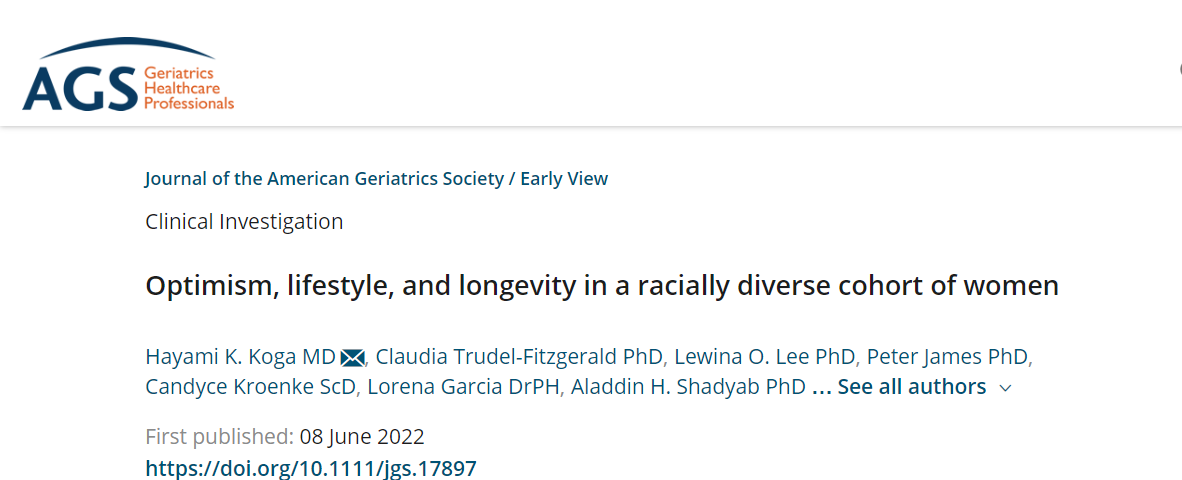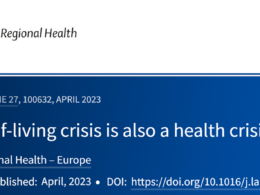Lifestyle factors, such as regular exercise and healthy eating, accounted for less than a quarter of the optimism-lifespan association in the study, indicating that other factors may be at play.
The Harvard Gazettte
BY Harvard Chan School Communications
June 8, 2022, Illustration by Tang Yau Hoong
Higher levels of optimism were associated with longer lifespans and living beyond age 90 in women across racial and ethnic groups in a study led by researchers at Harvard T.H. Chan School of Public Health.
Higher levels of optimism were associated with longer lifespans and living beyond age 90 in women across racial and ethnic groups in a study led by researchers at Harvard T.H. Chan School of Public Health.
“Although optimism itself may be affected by social structural factors, such as race and ethnicity, our research suggests that the benefits of optimism may hold across diverse groups,” said the study’s lead author, Hayami Koga, a Ph.D. student in the Graduate School of Arts and Sciences studying in the Population Health Sciences program in partnership with Harvard Chan School.
“Although optimism itself may be affected by social structural factors, such as race and ethnicity, our research suggests that the benefits of optimism may hold across diverse groups,”
“A lot of previous work has focused on deficits or risk factors that increase the risks for diseases and premature death.
Our findings suggest that there’s value to focusing on positive psychological factors, like optimism, as possible new ways of promoting longevity and healthy aging across diverse groups.”
Our findings suggest that there’s value to focusing on positive psychological factors, like optimism, as possible new ways of promoting longevity and healthy aging across diverse groups.”
The study was published Wednesday in the Journal of the American Geriatrics Society.
In a previous study, the research group determined that optimism was linked to a longer lifespan and exceptional longevity, which was defined as living beyond 85 years of age.
Because they had looked at mostly white populations in that previous study, Koga and her colleagues broadened the participant pool in the current study to include women from across racial and ethnic groups.
According to Koga, including diverse populations in research is important to public health because these groups have higher mortality rates than white populations, and there is limited research about them to help inform health policy decisions.
For this study, the researchers analyzed data and survey responses from 159,255 participants in the Women’s Health Initiative, which included postmenopausal women in the U.S. The women enrolled at ages 50–79 from 1993 to 1998 and were followed for up to 26 years.
Of the participants, the 25 percent who were the most optimistic were likely to have a 5.4 percent longer lifespan and a 10 percent greater likelihood of living beyond 90 years than the 25 percent who were the least optimistic.
Of the participants, the 25 percent who were the most optimistic were likely to have a 5.4 percent longer lifespan and a 10 percent greater likelihood of living beyond 90 years than the 25 percent who were the least optimistic.
The researchers also found no interaction between optimism and any categories of race and ethnicity, and these trends held true after taking into account demographics, chronic conditions, and depression.
Lifestyle factors, such as regular exercise and healthy eating, accounted for less than a quarter of the optimism-lifespan association, indicating that other factors may be at play.
Koga said that the study’s results could reframe how people view the decisions that affect their health.
Koga said that the study’s results could reframe how people view the decisions that affect their health.
“We tend to focus on the negative risk factors that affect our health,” said Koga.
“It is also important to think about the positive resources, such as optimism, that may be beneficial to our health, especially if we see that these benefits are seen across racial and ethnic groups.”
“It is also important to think about the positive resources, such as optimism, that may be beneficial to our health, especially if we see that these benefits are seen across racial and ethnic groups.”
This research was supported by the National Institutes of Health (R01AG053273, K08048221).
The Women’s Health Initiative is funded by the National Heart, Lung, and Blood Institute of the National Institutes of Health, and the Department of Health and Human Services.
Originally published at https://news.harvard.edu on June 8, 2022.
Names mentioned
Hayami Koga, a Ph.D. student in the Graduate School of Arts and Sciences studying in the Population Health Sciences program in partnership with Harvard Chan School.
ORIGINAL PUBLICATION (Excerpt)

Optimism, lifestyle, and longevity in a racially diverse cohort of women
Journal of the American Geriatrics Society
Hayami K. Koga MD, Claudia Trudel-Fitzgerald PhD, Lewina O. Lee PhD, Peter James PhD, Candyce Kroenke ScD, Lorena Garcia DrPH, Aladdin H. Shadyab PhD, Elena Salmoirago-Blotcher MD, PhD, JoAnn E. Manson MD, DrPH, Francine Grodstein ScD, Laura D. Kubzansky PhD
08 June 2022
ABSTRACT:
Background
- Research has suggested optimism is associated with healthy aging and exceptional longevity, but most studies were conducted among non-Hispanic White populations.
- We examined associations of optimism to longevity across racial and ethnic groups and assessed healthy lifestyle as a possible mediating pathway.
Methods
- Participants from the Women’s Health Initiative (N = 159,255) completed a validated measure of optimism and provided other demographic and health data at baseline.
- We evaluated associations of optimism with increments in lifespan using accelerated failure time models, and with likelihood of exceptional longevity (survival to age ≥90) using Poisson regression models.
- Causal mediation analysis explored whether lifestyle-related factors mediated optimism-lifespan associations.
Results
- After covariate adjustment, the highest versus lowest optimism quartile was associated with 5.4% (95% confidence interval [CI] = 4.5, 6.4%) longer lifespan.
- Within racial and ethnic subgroups, these estimates were 5.1% (95%CI = 4.0, 6.1%) in non-Hispanic White, 7.6% (95%CI = 3.6, 11.7%) in Black, 5.4% (95%CI = −0.1, 11.2%) in Hispanic/Latina, and 1.5% (95% CI = −5.0, 8.5) in Asian women.
- A high proportion (53%) of the women achieved exceptional longevity. Participants in the highest versus lowest optimism quartile had greater likelihood of achieving exceptional longevity (e.g., full sample risk ratio = 1.1, 95%CI = 1.1, 1.1).
- Lifestyle mediated 24% of the optimism-lifespan association in the full sample, 25% in non-Hispanic White, 10% in Black, 24% in Hispanic/Latina, and 43% in Asian women.
Conclusions
- Higher optimism was associated with longer lifespan and a greater likelihood of achieving exceptional longevity overall and across racial and ethnic groups.
- The contribution of lifestyle to these associations was modest.
- Optimism may promote health and longevity in diverse racial and ethnic groups.
- Future research should investigate these associations in less long-lived populations.
Originally published at https://agsjournals.onlinelibrary.wiley.com












